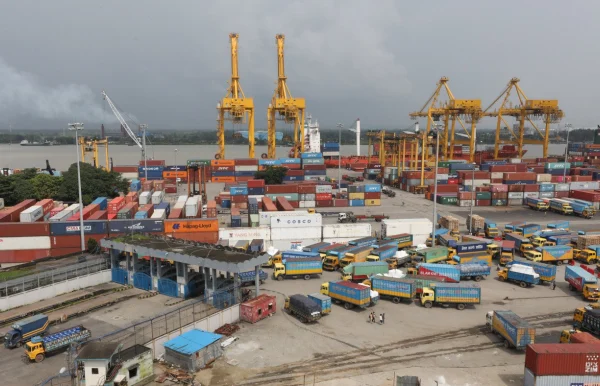Import of Ramadan essentials on the rise
- Update Time : Saturday, February 1, 2025

Ctg Correspondent:
There has been a steep surge in import of essential commodities ahead of the holy month of Ramadan. The volume of essentials imported in January alone is enough to meet the whole demand of Ramadan, and it may surpass the demand for some particular products.
According to importers, more consignments are expected to enter the country in February and boost the market supply before and during the holy month of fasting.
Imports by some industrial giants declined sharply following the political changeover in the country. It gave rise to a fear that the market supply would be disrupted significantly in the changed context.
However, the reality is in stark contrast as some established importers have resumed operations, and some new entities joined the business. In the aftermath, there have been no significant adversities in the market.
Whether the increased imports will lead to lower prices depends on import costs. Experts have called for monitoring the market as well as the supply chain regularly to ward off any untoward situations.
Over the imports and market situation, Mustafa Haider, managing director of TK Group, said imports went up in January, while more shipments are in the pipeline for February. Hence, there is no possibility of a supply shortage. “The global market is also stable, so there is no cause for concern.”
RISE IN IMPORTS
In an effort to boost imports and control prices, the interim government waived customs duties on different essential goods, including edible oil, sugar, onions, potatoes, and dates. Besides, the foreign exchange crisis eased up, clearing the way for opening letters of credit (LCs).
According to the Bangladesh Trade and Tariff Commission (BTTC), the usual market demand for edible oil during Ramadan is nearly 300,000 tonnes.
It was learned from the National Board of Revenue (NBR) and Chattogram Customs that nearly 400,000 tonnes of soybean and palm oil were imported in January. Besides, a total of 300,000 tonnes of soybean seeds – used to produce soybean oil – were imported, which are capable of yielding an additional 50,000 tonnes of oil. It means the supply would remain higher than the demand during Ramadan.
The usual demand for sugar during Ramadan is around 300,000 tonnes. In January alone, a total of 153,000 tonnes of unrefined sugar were imported – the highest in the past 15 months, while another 100,000 tonnes are awaiting unloading at the port. More imports are expected in February. It is worth mentioning that sugar prices have declined significantly in the global market.
Among other Ramadan staples, some 93,000 tonnes of chickpeas were imported in January against a Ramadan demand of 100,000 tonnes. Its imports were 15,000 tonnes in December. Some 62,000 tonnes of lentils entered the country in January, with an additional 25,000 tonnes reaching the port last Wednesday.
The demand for split pea during Ramadan is around 100,000 tonnes, while its imports in January reached 108,000 tonnes. Similarly, some 22,000 tonnes of dates arrived in January, with another major shipment expected in February.
Faruk Ahmed, owner of Faruk Trade International that imports date, told that traders ramped up imports as the reduction of duties has lowered import costs by Tk 30 to Tk 122 per kg. More shipments are expected in February ahead of Ramadan.
Onion imports have been low as the local varieties have hit the market. The price has also decreased significantly.
IMPORT COSTS UP BY 74PC
According to the NBR, Bangladesh imported onions, chickpeas, split peas, lentils, palm and soybean oil raw materials, sugar, wheat, and dates worth $1 billion in January, which is higher by nearly 74 per cent compared to the same period last year. The total import volume reached 1.624 million tonnes.
Around 88 per cent of Ramadan essentials are arriving through the Chattogram port. Some 32 ships were docked at the port on Friday, carrying 1.267 million tonnes of goods. A large portion of these shipments has already been unloaded, with the remainder in progress. Some ships have also departed the port after unloading.


















